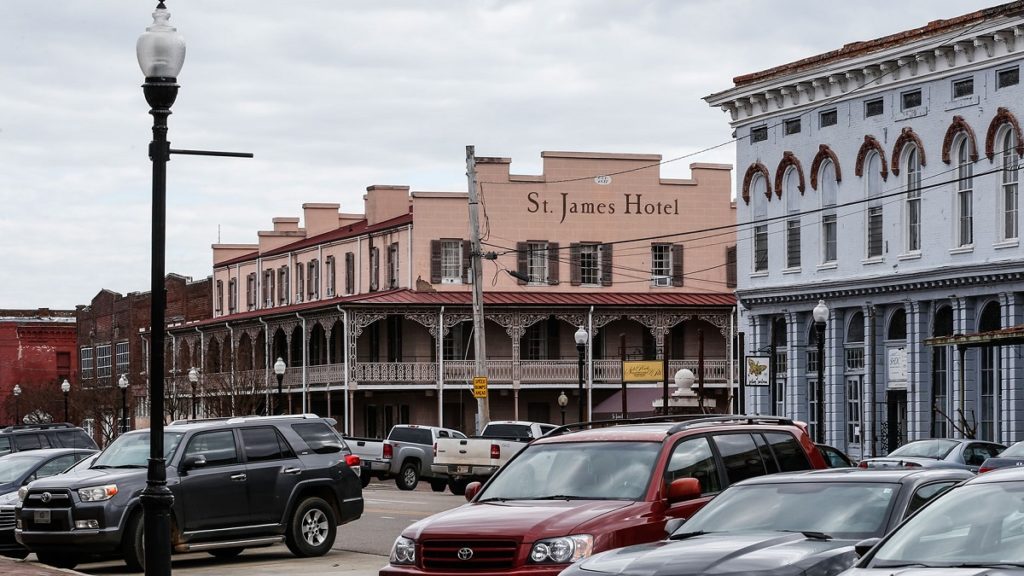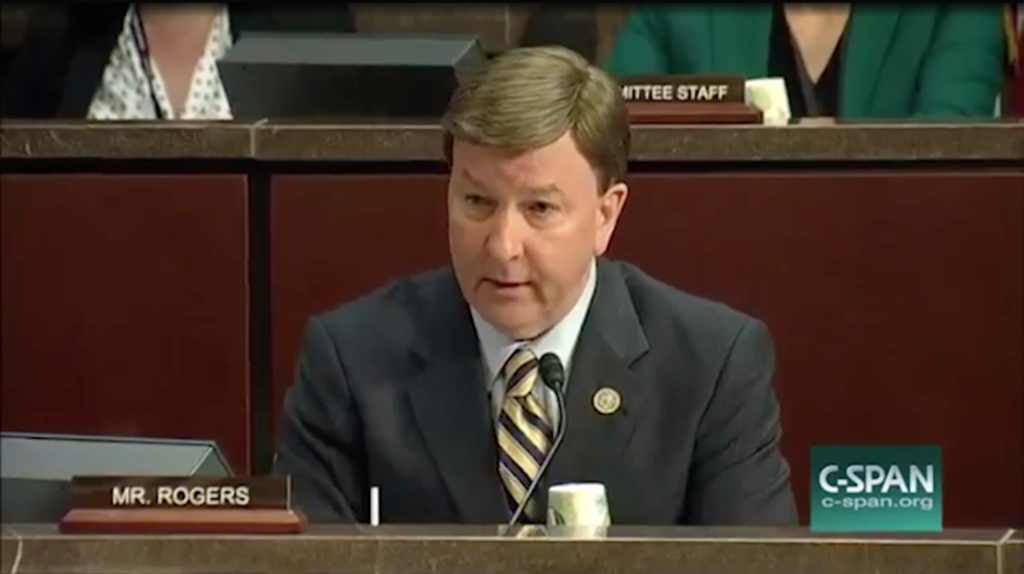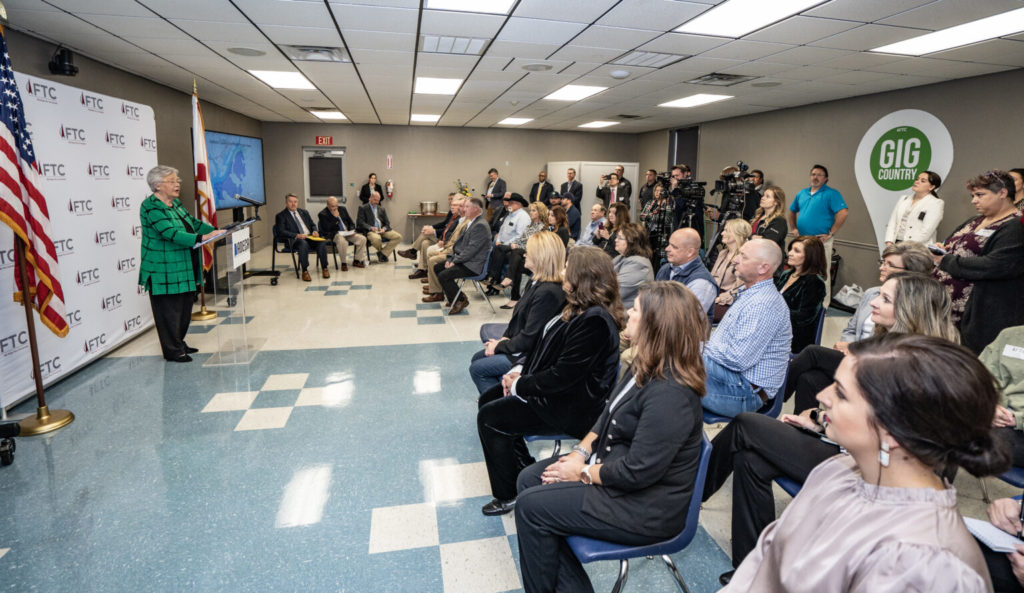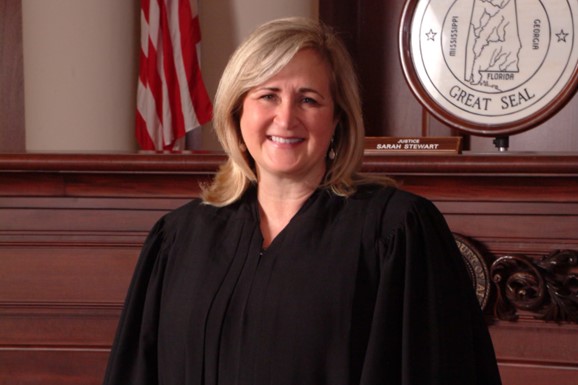Possible tornado hits Selma

Severe weather hit many parts of central Alabama on Thursday. Selma in Dallas County appears to have taken a direct hit from what appears to have been a tornado. The Mayor of Selma Mayor James Perkins Jr., issued an emergency message at around 2:00 O’clock to residents. “Most city streets are closed due to down power lines and trees. All schools have reported that students are at school and safe. It is not safe at this point to go to the schools or allow the children to leave the school,” the Mayor stated. From the Office of the Mayor: “Emergency response teams are on the ground providing assistance and cleaning right of ways. We are asking everyone to stay calm and stay in place until further notice.” The Mayor said that the City has “received significant damage from the tornado.” The City is asking for citizens to please refrain from traveling on the roadways and to stay away from down power lines. U.S. Representative Terri Sewell (D-AL07) wrote on Twitter, “My team and I are closely monitoring the severe weather affecting Selma, the Black Belt, and the surrounding communities. Praying for safety for all who are impacted!” Sewell is a Selma native. There are pockets throughout the state that have lost power. Severe weather is a threat in Alabama during all 12 months of the year. Tornados frequently impact the state. To connect with the author of this story, or to comment, email brandonmreporter@gmail.com.
Alabama Public Television names Wayne Reid as new Executive Director

Wayne Reid, a veteran television broadcaster of over 30 years, will join the Alabama Educational Television Commission (AETC) as its Executive Director. The Commission voted to extend the offer to Reid at its meeting on Tuesday, January 10, 2023. Ferris Stephens, Chairman of the Alabama Educational Television Commission, stated, “The legislature has assigned us a unique mission as a non-commercial educational agency for the state. We are excited about the background skills and energy that Wayne will bring to Alabama Public Television, including his experience in commercial broadcasting. “His overall background suits him well to help the Commission carry out its statutory responsibilities and take the network to a new level for the people of Alabama. We are extremely pleased to welcome Wayne as the leader of public television in the state. “The Commission has succeeded over the years with the excellent experience of Roy Clem and Phil Hutcheson leading public television, which has greatly benefited the State of Alabama. Phil will remain with us as Chief Financial Officer and our attorney.” Reid is married to his wife of 30 years, Kelly Reid, and has two college-aged children, Holden and Grier. Wayne is a native of Wichita, Kansas. Alabama Public Television’s award-winning broadcast and digital productions share the news and celebrate the life and culture of Alabama with all its citizens.
Mike Rogers named Chairman of House Armed Services Committee

Congressman Mike Rogers was named Chairman of the powerful House Armed Services Committee. Rep. Rogers will be the first Congressman from Alabama to serve as Chairman of the committee in history. “I am honored to have been selected by my House Republican colleagues to serve as Chairman of the House Armed Services Committee,” Rogers said in a statement. “Our nation faces unprecedented threats from China, Russia, North Korea, and Iran. In order to deter these threats and remain the most feared force in the world — we must ensure that our military focuses on lethality and capability. Over the next two years, the House Armed Services Committee will provide our warfighters with the resources and weapons they need to deter and, if necessary, defeat any adversary anywhere in the world.” “The committee will also hold the Biden administration accountable for misguided policies that distract from the core mission of the Department of Defense,” Rogers continued. “Initiatives that service a social agenda but don’t advance our national security will be scrutinized. Those in charge of these initiatives will come before the committee to explain how they will protect our national security. We will leave no stone unturned in holding the Biden administration accountable.” “Alabama has always played a critical role in supporting our national security,” Rogers concluded. “As the first Congressman from Alabama to serve as Chairman of the House Armed Services Committee, I look forward to continuing that legacy.” “Congratulations to my friend and colleague @RepMikeRogersAL on being named Chairman of @HASCRepublicans!” Congressman Jerry Carl wrote on Twitter. “I’ve enjoyed serving on Armed Services with Mike and seeing all he’s accomplished for Alabama, and I know he is the leader our nation needs on the committee.” Rogers served as the Ranking Republican member of the Committee during the 117 Congress under then Chairman Adam Smith. Under the rules of Congress, the party that controls the House of Representatives picks the Chairs of virtually all committees. Smith chaired then because Democrats controlled the House. Republicans won control of the House in the 118th Congress, so Rogers moved from being the Ranking member of the minority party to the Chairman’s role on the Committee. On Tuesday, the Pentagon released an order ending the divisive COVID-19 vaccine mandate for members of the armed forces. On Wednesday, Chairman Rogers released a statement applauding the end of the forced COVID-19 shots for military members. “Because of the hard work of House Republicans — the Department of Defense has finally rescinded the harmful COVID-19 vaccine mandate for servicemembers,” Rogers said. “I am proud to have fought for the inclusion of language in the Fiscal Year 2023 James M. Inhofe National Defense Authorization Act that directed the Department of Defense to end this mandate.” “Our work is not done,” Rogers added. “We will be looking into the impacts the COVID-19 vaccine mandate had on our readiness — especially its impact on the recruitment and retention of servicemembers. The House Armed Services Committee will continue to fight for our servicemembers and hold the Biden administration accountable for their harmful and misguided policies.” Rogers and other Republican members of Congress insisted on language being included in the FY2023 National Defense Authorization Act (NDAA), overturning Secretary of Defense Lloyd Austin’s shot mandate. Rogers is serving in his eleventh term representing Alabama’s Third Congressional District. Rogers is an attorney. He previously served as a State Representative and county commissioner. He and his family live in Saks in Calhoun County. To connect with the author of this story, or to comment, email brandonmreporter@gmail.com.
Robert Aderholt votes in favor of Born-Alive Abortion Survivors Protection Act

The U.S. House of Representatives on Wednesday passed legislation requiring that abortion doctors provide emergency care to infants that are born alive during an abortion. Congressman Robert Aderholt voted in favor of the bill and applauded its passage. “I was proud to speak on the House floor today in support of H.R. 26, which would require that babies born during an abortion be given the same medical care and treatment that any other baby born at that stage of development would be given,” Aderholt said in a statement on Facebook. “This bill has passed in the House before and previously received bipartisan support.” The National Right to Life Committee (NRLC), the nationwide federation of right-to-life organizations, supports the legislation – the Born-Alive Abortion Survivors Protection Act. “National Right to Life believes that it is time for Congress to act decisively to put the entire abortion industry on notice that when they treat a born-alive human person as medical waste or as a non-entity who may be subjected to lethal violence with impunity, they will do so at legal peril,” the group said in a statement. “H.R. 26 would enact an explicit requirement that a baby born alive during an abortion must be afforded “the same degree” of care that would apply “to any other child born alive at the same gestational age,” including transportation to a hospital.” The bill requires that babies born alive during abortions are treated in the same manner as those who are spontaneously born prematurely. The bill also applies the existing penalties of the federal murder statute to anyone who performs “an overt act that kills a child born alive.” It also provides a civil cause of action to women who are harmed by violations of the act. The House of Representatives also adopted Rep. Mike Johnson’s concurrent resolution that would condemn attacks on pro-life organizations. H.R. 26 was sponsored by Rep. Ann Wagner. “I have championed this issue for decades, and I have been blessed and honored to lead this legislation since 2019,” Wagner said. “Thanks to our efforts, after dozens of unanimous consent requests, two discharge petitions, and countless hours of advocacy work, the House has finally taken action to ensure that every single baby born in the United States receives lifesaving medical care at their most vulnerable moment. We must remember today that children are not the only victims of born-alive abortions. Women, fathers, and whole families all suffer deeply from the loss of their child. Our communities are weaker because these bright young ones did not grow up to share their wisdom, laughter, and ingenuity with us.” “Every single newborn, regardless the circumstances of their birth, deserves to share the miracle of life and have lifesaving medical care,” Wagner continued. “We must act with compassion to protect these little ones and give women a strong support system as they navigate the miracles and challenges of motherhood. This bill will save real lives, and it will give survivors a precious chance to build a future. Our world is blessed now that we all know the Republican majority is here to fight on behalf of the precious, innocent lives of those who cannot fight for themselves.” Speaker of the House Kevin McCarthy said that the House Republicans had promised to pass this legislation if they were given control of the House of Representatives. “House Republicans have been committed to advancing legislation that protects the lives of the unborn and their mothers,” McCarthy said in a statement. “In the very first week, we kept that commitment because strong families are the essence of American life. And in the face of a growing movement to devalue the miracle of life, we must also protect every American fighting for life – including those at pro-life pregnancy centers and churches from violence and threats. We will continue to prioritize the defense of life and all individuals from violence and intimidation.” The U.S. House of Representatives voted 220 to 210 in favor of passing H.R. 26. In addition to Aderholt, Congressmen Dale Strong, Barry Moore, Jerry Carl, Mike Rogers, and Gary Palmer voted in favor. Congresswoman Terri Sewell voted against it. Only one Democrat in the House voted in favor. No Republicans voted against the legislation. “We commend the House of Representatives for passing legislation to protect innocent children from infanticide and urge the Senate to follow suit,” said Bishop Michael F. Burbidge of Arlington, chairman of the U.S. Conference of Catholic Bishops’ Committee for Pro-Life Activities. “Babies who are born alive during the process of an abortion deserve compassionate care and medical attention – just the same as any other newborn baby.” The legislation now goes to the Senate for its consideration. Aderholt is the dean of the Alabama Congressional delegation. He is serving in his fourteenth term representing Alabama’s Fourth Congressional District. To connect with the author of this story, or to comment, email brandonmreporter@gmail.com.
Kay Ivey attends ceremonial groundbreaking for broadband projects in Jackson and DeKalb Counties

Alabama Governor Kay Ivey on Wednesday participated in a ceremonial groundbreaking for two broadband expansion projects in DeKalb and Jackson counties. These projects are funded by grants from the Alabama Broadband Accessibility Fund. “To thrive in a 21st-century world and a 21st-century economy, broadband must be made readily available so additional job opportunities can be created, education can be expanded past the walls of our classrooms, and healthcare services can be improved,” Ivey said in a statement. “The projects underway will bring world-class broadband service to the majority of the currently unserved portions in Dekalb and Jackson counties, serving as prime evidence that the state’s plan for expanding digital infrastructure is working efficiently. Providing access to high-speed internet connectivity for Alabamians across every corner of our state has been a top priority during my time as governor, and it will continue to be as we move into these next four years.” The Alabama Broadband Accessibility Fund grants are awarded through the Alabama Department of Economic and Community Affairs (ADECA). Farmers Telecommunications Cooperative released a statement on Facebook, “Today we were honored to host Alabama’s 54th Governor Kay Ivey, Alabama Speaker of the House Nathaniel Ledbetter (Rainsville native), and ADECA Director Kenneth Boswell for a ceremonial groundbreaking for our latest Alabama Broadband Accessibility Fund Grants. CEO Fred Johnson, Mentone Mayor Rob Hammond, and Jackson County Economic Development Authority President and CEO Nathan Lee also participated by sharing the monumental impact that these broadband projects will provide for these areas of DeKalb and Jackson Counties. FTC is grateful for the foresight of our Governor, Legislators, and ADECA for making rural broadband a priority in our great state of Alabama.” “Increasing broadband connectivity across Alabama has been a top priority throughout Governor Ivey’s administration, and ADECA has been proud to be able to support her as she works to accomplish that goal,” said Director Boswell. “Working closely with the Governor, the Legislature, internet service providers, and communities to develop planning, mapping, and managing grant programs to support broadband expansion efforts in the state leads to results like what we’re seeing today in Jackson and DeKalb counties. The mission to expand broadband access isn’t a sprint, it’s a marathon, and we look forward to continuing to run that race.” “If you want proof that what the state is doing on broadband is working – look no further than the projects currently underway here in these communities,” said Johnson. “Almost all unserved and underserved portions of these counties will have broadband access as a result of these projects, and I thank Governor Ivey and her administration for giving us the support we needed to make this possible.” ADECA awarded these grants in the latest round of Broadband Accessibility Act Funding in August 2022. The two grants total $7.7 million and will provide access to paid broadband service for 2,644 households currently unserved in the two counties. DeKalb County received $3.4 million to provide broadband access to 826 households, businesses, and public service institutions in or near the towns, cities, and communities of Mentone, Valley Head, Fort Payne, Cloudmont, Cloudland, Union Hill, Moon Lake, Ponderosa, Bankhead, Little River East Fork, Little River West Fork, Oakdale, Sylvania Gap, and DeSoto State Park. Jackson County received $4.37 million to provide broadband access to 1,818 households, businesses, and public buildings, including all or parts of the towns and communities of Dutton, Section, Langston, Powell, Macedonia, Davistown, Pleasant View, Hodge, and Hancock Crossing. Speaker Ledbetter represents much of this area in the Alabama House of Representatives in his House District 24. Ivey also announced updates to the Alabama Broadband Map to reflect the latest data, with an additional update coming later in January. The map and the Alabama Connectivity Plan serves to guide the state’s efforts and recommends strategies to expand broadband. Since 2018, Alabama has invested $63.9 million of state dollars through grant awards supporting 100 projects through the Alabama Broadband Accessibility Fund. 22,433 previously unserved addresses now have access to high-speed internet. An additional 39,196 currently unserved addresses are anticipated to have access to high-speed internet within the next two years. 61,000 Alabama households, businesses, Churches, and community institutions will gain access to broadband through these projects. This money is being supplemented with hundreds of millions of dollars in federal money from COVID relief and infrastructure funds that will further expand broadband in Alabama. Ivey and the legislature have made broadband expansion a priority over the last four years, and those efforts are ongoing. Ivey will be inaugurated into her second term on Monday. To connect with the author of this story, or to comment, email brandonmreporter@gmail.com.
With budget surplus, Alabama lawmakers consider tax rebates

Alabama lawmakers are eyeing possible tax rebates as the state sees a budget surplus of more than $2.7 billion. Legislators will face decisions on what to do with the rare surplus, including how much to save and how to spend the rest. The state budget that funds education has a $2.7 billion surplus, according to the Legislative Services Agency. The state general fund has a smaller surplus of $351 million. Sen. Arthur Orr, who chairs the Senate education budget committee, said lawmakers are working with Gov. Kay Ivey on a proposal but that he expects the plan to include rebate checks to taxpayers, along with tax cuts and putting money in reserves. “We believe, after we take care of state government, at least on the education side, we have enough to send back to the people of Alabama who sent it to us in the first place. In addition to that, with the economy and with inflation, they’re struggling, and so this would be a small manner of relief to them,” Orr said. He said lawmakers are considering $500 million in total rebates. The amount sent back to Alabamians will depend on how eligibility is defined, but he said they are looking at a minimum of $200 or $250 for individuals and $400 or $500 for married couples who file joint returns. The Republican lawmaker said he also expects proposals for tax cuts. But he said it is important that the state put a significant amount of money into reserves. “I think everyone realizes this is a one-time phenomenon having a surplus like this, and we need to put money back because the economy is getting tighter and tighter.” The Associated Press reported in August that at least 15 states have approved one-time rebates from their surpluses. There has been disagreement among lawmakers on how to use the rare surplus. “If we could do a tax rebate, we could expand Medicaid,” Senate Minority Leader Bobby Singleton said when asked about the rebate proposal. “I think that is something more substantial than doing a tax rebate. I think the citizens would get more out of an expansion of Medicaid than they would a one-time check to be able to spend.“ Alabama is one of only 11 states that did not expand its Medicaid program under the Affordable Care Act to provide health care coverage to low-income people, according to the Henry J. Kaiser Family Foundation. Democratic lawmakers in Alabama have long called for Medicaid expansion, arguing it would bring health care coverage to more than 300,000 people, many of them in working families who don’t have health insurance through their jobs. Republicans, who hold a lopsided majority in the Alabama Legislature, have so far opposed expansion. Sen. Greg Albritton, who chairs the Senate general fund budget committee, said he wants to make sure the state has enough in reserves so it won’t face budget cuts during an economic downturn. “The first priority is getting ready for hard times. I don’t know how bad, or if, a recession will occur, but my job is to try to make sure that we are prepared as we possibly can,” Albritton said. Albritton said rebates will “be on the table.” But added he would like to see the state put the education surplus in a trust to fund scholarships. “I think that would be a better return to the taxpayers than a simple rebate,” he said. Republished with the permission of The Associated Press.
County commission chair Albert Turner Jr. indicted on voter fraud charge

The son of Alabama civil rights activists has been indicted on charges of voter fraud, but he called the accusations nothing more than “political theatre.” Perry County Commission Chairman Albert Turner Jr. has been charged with voting more than once and violating Alabama’s law that prohibits the fraudulent collection and filling of other people’s absentee ballots. The charges were announced Wednesday by Alabama Secretary of State John Merrill and District Attorney Michael Jackson. Jackson said Turner is accused of running multiple ballots through a voting machine during the May 2022 Democratic primary election. He is also accused of breaking state law as regards using absentee ballots, Jackson said. Turner was seen with a “stack” of absentee ballot material at the post office, he said. “He was stuffing the machine with the ballots that he had already filled out for the folks he was supporting. He did that for a good little while, and he had some folks distracting the poll watchers,” Jackson said. Turner told the Associated Press that he did know about the charges, but that he did nothing wrong. “I am not concerned about any charge he has announced, and I will not waste any energy on political theatre. It is mighty funny that Little Mike waited until he was leaving office to make his charge because he knows he can’t prove his case,” Turner wrote in a text message. Turner’s cousin, Robert H. Turner Jr., defeated Jackson, in the Democratic primary. He takes office later this month. Jackson said the case is being handled by the attorney general’s office to avoid a conflict. Turner is the son of civil rights activists Albert Turner Sr. and Evelyn H. Turner. Albert Turner Sr. was Alabama field secretary for the Southern Christian Leadership Conference in 1965 when he helped lead the aborted Selma-to-Montgomery march that became known as “Bloody Sunday” when marchers were beaten by state troopers. He led the mule wagon that carried the body of the Rev. Martin Luther King Jr. at his funeral. The elder Turner died in 2000. Republished with the permission of The Associated Press.
April Weaver: When good time is no good

Bibb County Deputy Brad Johnson was a good friend of the Weaver family who knew he could always stop by our house for a warm welcome and good conversation while on patrol in our area, so it hit close to home – both emotionally and geographically – when he was murdered at essentially the foot of our driveway. Deputy Johnson was killed, and Deputy Chris Poole was also shot in the head while chasing a stolen car being driven by Austin Hall, a felon who had been given early release from prison after earning “good time” credits despite his bad behavior behind bars. A literal fatal flaw in Alabama’s “good time law” prompted Hall’s premature release from prison even though he had previously escaped from a work release program and had other attempted escapes and violent actions on his record. Had Hall served his full prison sentence as his behavior should have required, Deputy Johnson would still be alive today. I have pledged to honor the loss of Deputy Johnson and recognize the suffering of Deputy Poole by passing legislation that plugs the hole in our good time law and ensures that such senseless and outrageous loss is never allowed to occur again. Good time, which was formerly known as “correctional incentive time,” was originally designed to encourage an inmate to behave while in custody, improve themselves in prison, and respect the orders and authority of correctional officers. Ultimately, it was a tool to help improve the safety of our correctional officers who work in environments that are inherently dangerous and often unforgiving. Encouraging good behavior in prison by rewarding an inmate with days off of his sentence can make sense if done wisely, but today, the automatic revolving door nature of early release has removed the incentive altogether. In Alabama, the law allows inmates to have up to 75 days removed from their prison sentence for every 30 days served, meaning that prisoners can serve less than one-third of their sentence. An individual sentenced to serve 15 years in prison for manslaughter, for example, could be released in little more than four years, and someone sentenced to ten years for a brutal assault could serve less than three years behind bars. Though the Legislature previously limited the categories of offenders eligible for good time, the events in Bibb County offer striking evidence that more changes must be made immediately, which is why I am asking for my reform legislation to be fast-tracked when the next session convenes. Accruing good time is currently treated as a rule that is rarely, if ever, suspended, not as a privilege that is earned only through compliant actions and proper behavior. My legislation will clearly require all inmates to prove themselves for a set term of months before good time can begin to be accrued rather than continuing the current system of starting the clock when the cell door shuts. Under the current system, good time may also be earned even if the inmate has committed crimes while incarcerated. The law as it stands, does not list any conduct occurring behind bars that would disqualify an inmate from continuing to earn good time. My legislation will explicitly prohibit access to good time for those who commit serious offenses in prison. Perhaps most troubling, Alabama currently allows more than double the amount of good time as ultra-liberal California, and our inmates are released earlier than those in 23 other states. My legislation will ensure that the reward of good time is allotted in reasonable portions and does not wholly undermine the original sentence. In recent years, our state and nation have been subjected to a deadly crime wave, and no amount of manipulated data can overshadow the headlines and offenses that all of us witness daily. Given our state’s strict adherence to traditional values, Alabama should be the safest place in the country, but making that goal a reality will require an immediate course correction in policy. On the first day of the 2023 regular session, I will ask my fellow lawmakers to join me in recognizing the suffering and sacrifice of deputies Johnson and Poole by making good time an earned privilege – not an automatic right – and taking a firm step toward truth in sentencing. April Weaver represents Senate District 14, which includes portions of Bibb, Chilton, and Shelby counties. A former member of the Alabama of Representatives, she also served as regional director of the U.S. Department of Health and Human Services under President Donald Trump.
Sarah Stewart running for Alabama Chief Justice

Alabama Supreme Court Justice Sarah Stewart announced that she will seek the Republican Party nomination for Chief Justice of the Alabama Supreme Court in the March 2024 primary election. Chief Justice Tom Parker currently holds the state court’s top job. However, state law prohibits him from seeking another term. “I will fiercely safeguard our freedoms enshrined in the Constitution – from the right to praise God freely to the power of state government,” Justice Stewart announced. “Five of the original ten amendments to the US Constitution are about the justice system, and as Chief Justice, I want Alabamians to be confident in the strength of our courts.” Justice Stewart was elected as a Republican in November 2018 for a six-year term as an Associate Justice on the Alabama Supreme Court. Prior to her election, Justice Stewart served for thirteen years as a Circuit Judge in Mobile County, where she handled over 1,800 criminal and civil cases per year. Justice Stewart was appointed Circuit Judge by Governor Bob Riley in January 2006 and was elected as a Republican without opposition in November 2006, 2010, and 2016. “I am humbled by and take seriously the faith Alabama citizens placed in me by electing me to the trial court bench three times and then to the highest court in our State in 2018,” Stewart added. “I have a proven conservative record, and I understand Alabama values. It is important for a Justice to have strongly developed judicial values. My work as a Justice speaks for itself – I will never legislate from the bench, and I will always strongly defend your constitutional rights.” Justice Stewart earned her J.D. from Vanderbilt Law School in 1992. She earned her B.A. and M.A. from the University of Arkansas. She is married to Craig Richard Stewart, originally of Selma. They have two children and are members of Ashland Place Methodist Church.


